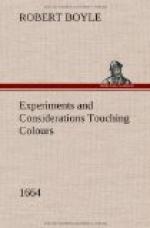I took a quantity Fair water, & put to it in a clear
Glass phial, a convenient quantity of Oyl or Spirit
of Turpentine, because that Liquor will not incorporate
with Water, and yet is almost as Clear and Colourless
as it; these being Gently Shaken together, the Agitation
breaks the Oyl (which as I said, is Indispos’d
to Mix like Wine or Milk per minima with the
Water) into a Multitude of Little Globes, which each
of them Reflecting Outwards a Lucid Image, make the
Imperfect Mixture of the two Liquors appear Whitish;
but if by Vehemently Shaking the Glass for a competent
time you make a further Comminution of the Oyl into
far more Numerous and Smaller Globuli, and
thereby confound it also better with the Water, the
Mixture will appear of a Much greater Whiteness, and
almost like Milk; whereas if the Glass be a while
let alone, the Colour will by degrees Impair, as the
Oyly globes grow Fewer and Bigger, and at length will
quite Vanish, leaving both the Liquors Distinct and
Diaphanous as before. And such a Tryal hath not
ill succeeded, when insteed of the Colourless Oyl of
Turpentine I took a Yellow Mixture made of a good
Proportion of Crude Turpentine dissolv’d in
that Liquor; and (if I mis-remember not) it also Succeeded
better than one would expect, when I employ’d
an Oyl brought by Filings of Copper infused in it,
to a deep Green. And this (by the way) may be
the Reason, why often times when the Oyls of some
Spices and of Anniseeds &c. are Distilled in a Limbec
with Water, the Water (as I have several times observ’d)
comes over Whitish, and will perhaps continue so for
a good while, because if the Fire be made too Strong,
the subtile Chymical Oyl is thereby much Agitated and
Broken, and Blended with the Water in such Numerous
and Minute Globules, as cannot easily in a short time
Emerge to the Top of the Water, and whilst they Remain
in it, make it, for the Reason newly intimated, look
Whitish; and perhaps upon the same Ground a cause
may be rendred, why Hot water is observ’d to
be usually more Opacous and Whitish, than the same
Water Cold, the Agitation turning the more Spirituous
or otherwise Conveniently Dispos’d Particles
of the Water into Vapours, thereby Producing in the
Body of the Liquor a Multitude of Small Bubbles, which
interrupt the Free passage, that the Beams of Light
would else have Every way, and from the Innermost
parts of the Water Reflect many of them Outwards.
These and the like Examples, Pyrophilus, have
induc’d me to Suspect, that the Superficial
Particles of White bodies, may for the Most part be
as well Convex as Smooth; I content my self to say
Suspect and for the most part, because
it seems not Easie to prove, that when Diaphanous bodies,
as we shall see by and by, are reduc’d into
White Powders, each Corpuscle must needs be of a Convex
Superficies, since perhaps it may Suffice that Specular
Surfaces look severally ways. For (as we have
seen) when a Diaphanous Body comes to be reduc’d




